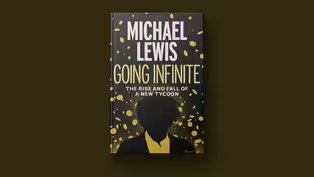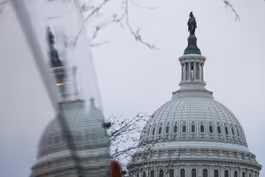
Brooks and Capehart on GOP struggle to elect House speaker
Clip: 10/20/2023 | 9m 53sVideo has Closed Captions
Brooks and Capehart on the GOP struggle to elect a House speaker and Biden's aid request
New York Times columnist David Brooks and Washington Post associate editor Jonathan Capehart join Geoff Bennett to discuss the week in politics, including the search for a new speaker of the House and President Biden's plea for national security funding.
Problems playing video? | Closed Captioning Feedback
Problems playing video? | Closed Captioning Feedback
Major corporate funding for the PBS News Hour is provided by BDO, BNSF, Consumer Cellular, American Cruise Lines, and Raymond James. Funding for the PBS NewsHour Weekend is provided by...

Brooks and Capehart on GOP struggle to elect House speaker
Clip: 10/20/2023 | 9m 53sVideo has Closed Captions
New York Times columnist David Brooks and Washington Post associate editor Jonathan Capehart join Geoff Bennett to discuss the week in politics, including the search for a new speaker of the House and President Biden's plea for national security funding.
Problems playing video? | Closed Captioning Feedback
How to Watch PBS News Hour
PBS News Hour is available to stream on pbs.org and the free PBS App, available on iPhone, Apple TV, Android TV, Android smartphones, Amazon Fire TV, Amazon Fire Tablet, Roku, Samsung Smart TV, and Vizio.
Providing Support for PBS.org
Learn Moreabout PBS online sponsorshipGEOFF BENNETT: For more on the drama in Washington, from the search for a House speaker to the president's plea for national security funding, we turn to the analysis of Brooks and Capehart.
That's New York Times columnist David Brooks and Jonathan Capehart, associate editor for The Washington Post.
It's good to see you both.
Let's start with the chaos and paralysis on Capitol Hill, starting with you, David.
Your reaction to Congressman Jim Jordan losing his third vote for speaker and then ultimately being booted from House Republicans from the race entirely?
DAVID BROOKS: Yes, loss of a great statesman.
To me, it's two things.
First, it's become clear that the party is like a coalition between two different parties.
There's like the Trump party, which Jordan is obviously an example of.
But then there are still some pre-Trump Republicans in there, and they're angry.
And so they have been pushed around and pushed around.
And, frankly, a lot of them have been motivated by threats of -- by death threats, and they're sick of it.
And so they're saying, no, nobody's bullying us around anymore.
So they have stood up for themselves.
And so now we have two blocks that are really irreconcilable, almost, with each other, with as much chaos and madness and hatred in public as it's possible to imagine.
And then the underlying cause is that you have a rising group of Republicans who have no loyalty to the institutions and its norms.
And so, normally, you lose to Steve Scalise your speaker's race, well, you rally around him, because it's for the good of the party.
It's for the good of the institution.
But those rules don't apply anymore.
And so it's very hard to run a party, let alone elect a speaker, if you're not going to put the institution before yourself.
And so we now have a lot of narcissists hugging TV cameras and sort of doing sort of parallel play with each other, because they can't team up with other people.
GEOFF BENNETT: And, Jonathan, it speaks volumes that Jim Jordan was dismissed by secret ballot.
He lost 25 Republican votes on the floor in public, but, behind closed doors, in the secret ballot, he lost 112 Republicans.
JONATHAN CAPEHART: Yes.
And what that means is that the sort of the public intimidation worked, when they had to go to the floor and before their colleagues and before the nation declared their fealty to Jordan or their fealty to someone else.
But behind closed doors, they were actually able to say what they really felt.
And I'm going to jump on -- jump on in support of what David was just talking about.
Yes, Steve Scalise was an institutionalist.
Jim Jordan, Congressman Jordan, is not an institutionalist.
He has never been about governing.
He's been about burning the place down.
And the idea that he was speaker-designate says a lot about where the Republican Party is.
And the idea that he thought that he was going to be speaker of the House, he was not interested in governing, not interested in governing at all.
If he had been, he would have a law with his name attached to it.
But he came to Washington to deconstruct - - deconstruct government, deconstruct the House.
I applaud the Republican Conference for secretly, but at least booting him from being speaker-designate.
But now the bigger question is, who in the Republican Party, in that Republican Conference, can get 217 votes in order to be speaker outright?
And I don't see who that is.
GEOFF BENNETT: It's a good question.
And I will add this question.
Why were Republicans unable to clinch victory from the jaws of defeat?
There was this viable option, empowering Patrick McHenry as a temporary House speaker.
Democrats would have supported that.
Enough Democrats would have supported that, but, ultimately, Republicans killed it.
DAVID BROOKS: Yes.
And I think that's just because they failed to put governing first.
I mean, we're at a situation where there are Ukraine aid, where Israel aid, all these major issues are on the floor.
And, in a normal time, as Jonathan said, if people are interested in legislating, in governing, in the actual physical state of the country, they say, well, this is not the time to have a brawl.
But if you have been raised your whole career to think the point of coming to Congress is not to pass legislation, but to get on FOX News, then that's just your default way of being in the world.
You -- Matt Gaetz, Jordan, they don't have another way of being in the world.
And so it became like a -- just a gang war in high school.
It became like a turf war from "West Side Story" or something like that.
And it's very hard to pull out of that.
GEOFF BENNETT: Well, let's shift our focus from Capitol Hill to the White House and President Biden's speech last night.
He was talking about how, as he sees it, the wars in Israel and in Ukraine, the wars that both countries are fighting, are not just their own, but that they're linked directly to U.S. national security interests.
What were your takeaways from that address last night, Jonathan?
JONATHAN CAPEHART: I thought the president's speech was a home run, in that he stood up for American values, American national security, but also for small-D democratic values.
There is a link between the fight that's going on, Ukraine's fight with Russia, in terms of Russia, Putin's invasion of Ukraine, and also Israel fighting for its democracy as a result of the terrorist attacks by Hamas.
If those democracies were to fall to those terroristic activities, then what does that mean for the democratic, again, small-D democratic experiment around the world?
And I think the president was absolutely right to say that, in both those efforts, the United States is the indispensable nation.
It is -- it's not to say that America is exceptional or anything, but when Putin invaded Ukraine, the world turned to Biden to pull it together, the coalition together.
When Hamas attacked Israel -- I mean, Israel can protect itself, but when it comes to talking to other nations about opening up humanitarian lines to Gaza and things like that, they turn to the United States.
American power is essential.
And I think the president, in giving a speech, is saying to Republicans that you must, you must get your act together, because these nations need America's help.
There's only about 26, 27, 28 days until that continuing resolution expires, Geoff, and there are only nine legislative, nine working days to get something done.
GEOFF BENNETT: The president, in his address last night, as Jonathan mentioned, he said the U.S. holds the world together.
It was very much a recitation of President Biden's world view.
DAVID BROOKS: Yes, and it was the essence of his world view and maybe why he was elected.
At this moment, he used the word inflection point.
And I think he's right, in that is one thing.
There's a foreign policy scholar named Robert Kagan who wrote a book a couple years ago now called "The Jungle Grows Back."
And the core point of that book is, people can take U.S. leadership for granted, but when the U.S. begins withdrawing, then that's a green light to Putin, that's a green light to Hamas.
And so the U.S. has to be involved.
It's not a role we have ever loved.
But if you happen to be as dominant an economic and military power as you are, it's a role that's thrust upon you.
And if you don't take these actions, then it's immensely costly.
And the president and the administration put together an aid package that includes aid to Israel, aid to Ukraine.
It's some on the Southern border.
It's a big multi let's-keep-the-world-safe aid package, let's fight-off-barbarism aid package.
And it's expensive.
But imagine the cost if Ukraine fell.
Imagine how much our defense budget would have to go up if China took over Taiwan or if somehow Hamas was able to push Israel out of existence.
Imagine how much we're spending.
So, to me, this bill that the administration has put together, while costly, is way less than the alternatives.
GEOFF BENNETT: Well, we have a couple of minutes left.
And I want to talk about the increased legal exposure facing Donald Trump, in that his former campaign attorney Kenneth Chesebro and his former legal adviser Sidney Powell both pleaded guilty.
They accepted plea deals in that Fulton County election subversion case.
What do you think this means for Donald Trump, Jonathan?
(LAUGHTER) JONATHAN CAPEHART: There's a great scene in the movie "Ghost" where Whoopi Goldberg says to Demi Moore, "Molly, you in danger, girl."
(LAUGHTER) JONATHAN CAPEHART: And if I were to see Donald Trump, I would say exactly that to him.
People were giving Fulton County DA Fani Willis a hard time for the number of indictments she leveled, wondering whether she is biting off more than she could chew bringing this huge case.
And we're seeing why she did it, because she knew, as all prosecutors know, that someone or multiple someones will flip.
What's interesting is, we went from a bail bondsman, to the COO in Sidney Powell, to the chief architect in Kenneth Chesebro.
And if you are Donald Trump, and those were your fellow defendants, I would be quaking.
I'd be shivering in my boots.
GEOFF BENNETT: How do you see it?
DAVID BROOKS: Yes, I think the significant thing was, according to legal experts, that Powell got an awesome deal, that she did stuff that was credibly felonious.
And with this deal, she's not going to jail.
She gets a misdemeanor.
She gets probation.
And so the fact that they offered her such a sweet deal is a sign they really wanted her to testify.
So that's not a sign that she's going to tell the truth, and Donald Trump is going to get off scot-free.
You don't offer somebody a deal if that's what the evidence shows.
So, Trump should be worried.
And we as a country should be worried for that moment when he starts winning primaries and getting convicted in the same week.
It could happen.
And I have no idea what that looks like.
GEOFF BENNETT: David Brooks and Jonathan Capehart, thanks, as always.
Have a good weekend.
DAVID BROOKS: You too.
JONATHAN CAPEHART: Thanks, Geoff.
American mother and daughter held hostage released by Hamas
Video has Closed Captions
Clip: 10/20/2023 | 4m 8s | American mother and daughter kidnapped by Hamas are first hostages released from Gaza (4m 8s)
Darius Rucker reflects on his diverse and decorated career
Video has Closed Captions
Clip: 10/20/2023 | 8m 41s | Darius Rucker reflects on his diverse career and his personal new album (8m 41s)
Israeli airstrike hits Greek Orthodox church in Gaza
Video has Closed Captions
Clip: 10/20/2023 | 6m 41s | Israeli airstrike hits Greek Orthodox church in Gaza, killing more than a dozen (6m 41s)
Michael Lewis on his controversial book on Sam Bankman-Fried
Video has Closed Captions
Clip: 10/20/2023 | 7m 11s | Michael Lewis on his controversial book documenting the rise and fall of Sam Bankman-Fried (7m 11s)
Next steps for GOP after dropping Jordan as speaker nominee
Video has Closed Captions
Clip: 10/20/2023 | 3m 57s | The next steps for House Republicans after dropping Jim Jordan as speaker nominee (3m 57s)
Palestinian in U.S. on struggle to contact family in Gaza
Video has Closed Captions
Clip: 10/20/2023 | 6m 19s | Palestinian living in U.S. describes struggle to contact family in Gaza (6m 19s)
Providing Support for PBS.org
Learn Moreabout PBS online sponsorshipSupport for PBS provided by:
Major corporate funding for the PBS News Hour is provided by BDO, BNSF, Consumer Cellular, American Cruise Lines, and Raymond James. Funding for the PBS NewsHour Weekend is provided by...

















